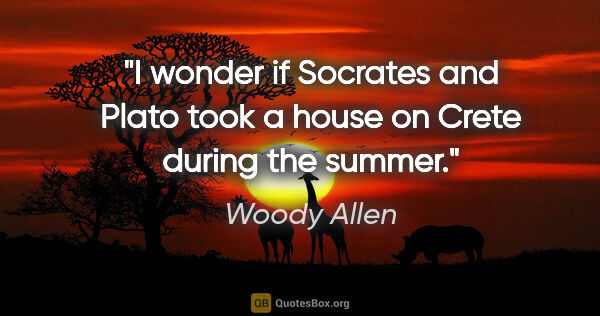Socratic Quotes (page 3)
Maybe even more important than the D.B.P. [Divine Brotherhood of Pythagoras], -wise is the protomystic Parmenides of Elea (c.515-? BCE), not only because of his distinction between the 'Way of Truth' and 'Way of Seeing' framed the terms of Greek metaphysics and (again) influenced Plato, but because Parmenides' #1 student and defender was the aforementioned Zeno, the most fiendishly clever and upsetting philosopher ever (who can be seen actually kicking Socrates' ass, argumentatively speaking,...
David Foster Wallace
While they were preparing the hemlock, Socrates was learning how to play a new tune on the flute. “What will be the use of that?” he was asked. “To know this tune before dying.” If I dare repeat this reply long since trivialized by the handbooks, it is because it seems to me the sole serious justification of any desire to know, whether exercised on the brink of death or at any other moment of existence.
Emile M. Cioran
--Here, my good man. Could you tell me whereabouts Horatio Street... good heavens. Thus called upon, he took courage; the sursum corda of an extravagant belch straightened him upright, and he answered, --Whfffck? Whether this was an approach to discussion he had devised himself, or a subtle adaptation of the Socratic method of questioning perfected in the local athenaeums which he attended until closing time, was not to be known; for the answer was,--Stand aside.
William Gaddis

Though it may be the peculiar happiness of Socrates and other geniuses of his stamp, to reason themselves into virtue, the human species would long ago have ceased to exist, had it depended entirely for its preservation on the reasonings of the individuals that compose it." Par 1, 36
Jean-Jacques Rousseau
Concerning the Gods, there are those who deny the very existence of the Godhead; others say that it exists, but neither bestirs nor concerns itself not has forethought far anything. A third party attribute to it existence and forethought, but only for great and heavenly matters, not for anything that is on earth. A fourth party admit things on earth as well as in heaven, but only in general, and not with respect to each individual. A fifth, of whom were Ulysses and Socrates, are those that...
Epictetus

